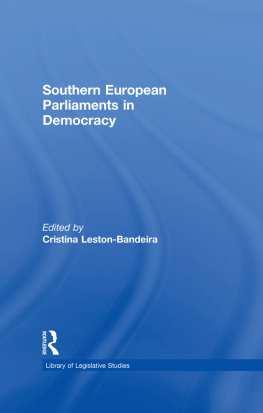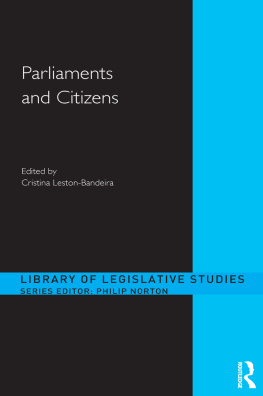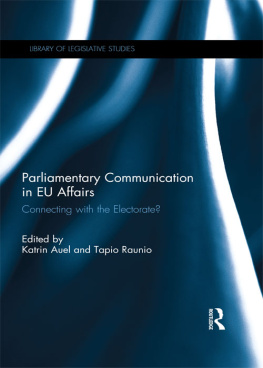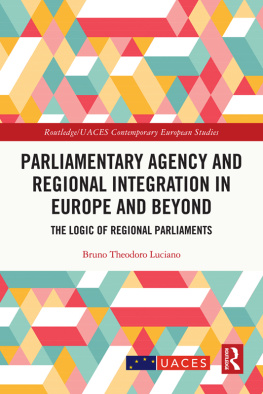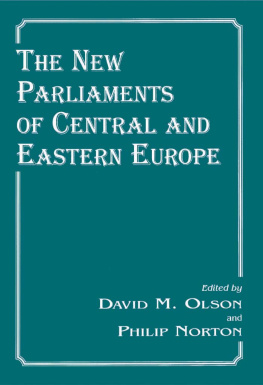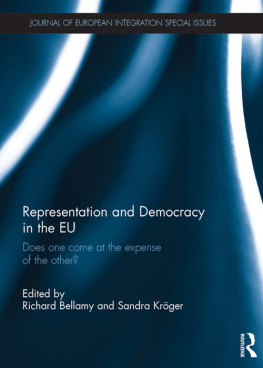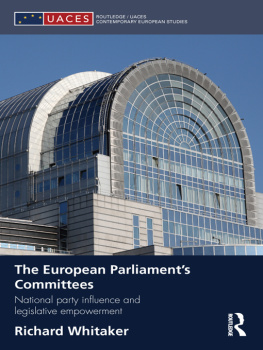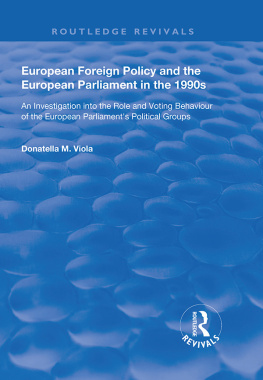Southern European Parliaments in Democracy
Southern European Parliaments in Democracy analyses the development of the parliaments of Greece, Italy, Portugal, Spain and Turkey since the mid-1980s. This book considers the challenges of the transition to democracy and outlines how the Parliaments of Southern Europe have adapted to the pressures of a democratic polity. Its focus is an assessment of the main changes that have taken place since the periods of transition to democracy right up to the present day. Chapters are country specific and consider a variety of indicators, from legislation and scrutiny to the social background of MPs.
This book was previously published as a special issue of The Journal of Legislative Studies.
Cristina Leston-Bandeira is a Lecturer in Legislative Studies at the University of Hull.
Library of Legislative Studies
General Editor: Philip Norton
ISSN 1460-9649
A series of new and recent books exploring the role of legislature in contemporary political systems.
The volumes typically draw together a team of country specialist to provide in-depth analysis.
Parliaments in Contemporary Western Europe
Edited by Philip Norton
Volume 1: Parliaments and Governments in Western Europe
Volume 2: Parliaments and Pressure Groups in Western Europe
Volume 3: Parliaments and Citizens in Western Europe
Second Chambers
Edited by Nicholas D.J. Baldwin and Donald Shell
Delegation and Accountability in European Integration
The Nordic Parliamentary Democracies and the European Union
Edited by Torbjrn Bergman and Erik Damgaard
The Uneasy Relationships between Parliamentary Members and Leaders
Edited by Lawrence D. Longley and Reuven Y. Hazan
Parliaments in Asia
Edited by Philip Norton and Nizam Ahmed
Conscience and Parliament
Edited by Philip Cowley
The New Roles of Parliamentary Committees
Edited by Lawrence D. Longley and Roger H. Davidson
Members of Parliament in Western Europe Roles and Behaviour
Edited by Wolfgang C. Mller and Thomas Saalfeld
Parliaments in Western Europe
Edited by Philip Norton
The New Parliaments of Central and Eastern Europe
Edited by David M. Olson and Philip Norton
National Parliaments and the European Union
Edited by Philip Norton
Southern European Parliaments in Democracy
Edited by
Cristina Leston-Bandeira
First published 2005 by Routledge
2 Park Square, Milton Park, Abingdon, Oxon, OX14 4RN
Simultaneously published in the USA and Canada
by Routledge
711 Third Avenue, New York, NY 10017
Routledge is an imprint of the Taylor & Francis Group
2005 Cristina Leston-Bandeira
Typeset in Times by Techset Composition Limited
All rights reserved. No part of this book may be reprinted or reproduced or utilised in any form or by any electronic, mechanical, or other means, now known or hereafter invented, including photocopying and recording, or in any information storage or retrieval system, without permission in writing from the publishers.
British Library Cataloguing in Publication Data
A catalogue record for this book is available from the British Library
Library of Congress Cataloging in Publication Data
A catalog record for this title has been requested
ISBN 0-415-35888-4
Contents
| Cristina Leston-Bandeira |
| Giliberto Capano and Marco Giuliani |
| Luca Verzichelli |
| Cristina Leston-Bandeira and Andr Freire |
| Penelope Foundethakis |
| Jordi Capo Giol |
| Pablo Onate |
| lter Turan |
| Philip Norton and Cristina Leston-Bandeira |
CRISTINA LESTON-BANDEIRA
The Study of Southern European Parliaments
The emergence of new democracies in Southern Europe in the 1970s led to a proliferation of literature on theories of transition to and consolidation of democracy. Here were several countries with geographical, cultural and historical similarities going through a concomitant experience of introducing democracy after a period of authoritarian regimes. This provided an excellent opportunity to develop and deepen theories on democratisation, leading to prolific and seminal literature. As a consequence, there is no adequate study of how institutions, notably parliaments, have developed as democracy has become established in Southern Europe.
Rather than looking at two separate moments (new versus established democracy), it is important to ascertain how parliaments adapt to the process of democratisation. The values of legitimacy and representation are very dear to newly democratic parliaments, but as the practice of democracy settles in, the values of efficacy and stability become more and more important. The purpose of this special issue is to ascertain how the parliaments of Greece, Italy, Portugal, Spain and Turkey have adapted to the pressures of a democratic polity.
The only book to date entirely dedicated to the parliaments of Southern Europe was the one edited by Ulrike Liebert and Maurizio Cotta: Parliament and Democratic Consolidation in Southern Europe ,the role played by those parliaments in the process of democratic transition and consolidation. Although this was a vital contribution in making Southern European (SE) parliaments known to the scholarly community, it has inevitably become outdated. Fifteen years have passed since the chapters for that volume were written and since then the SE democracies have developed and gone through numerous changes. There is not only a need for an updated account of these parliaments many scholars doing comparative work often look for a more updated version, only to realise that they only have that volume to quote from but also for a volume that centres on the practice of democracy in these parliaments.
Today, a different perspective has to be adopted in order to understand these parliaments. The role of a newly democratic parliament is necessarily different once democracy starts to mature. However, parliaments in SE are often considered in the same way as other Western European democratic parliaments; as if, once passed the transitional period, they would acquire the same characteristics as democratically well-established legislatures. As a consequence, many features are usually taken for granted whilst others more relevant are disregarded. Introduced as a central element of the new regimes, parliament has personified in all five SE countries the principle of democratic legitimacy. As democracy consolidated and started to mature, the need for efficacy became more pressing; the main issue ceased to be how legitimate was the new regime, but rather how effective it was in delivering outputs. In this context, parliaments had to adapt not only in terms of their role in the political system but also in their internal organisation. This volume will help to clarify whether this duality of change role in political system and internal organisation indicates the specificity of the development of new institutions such as those of Southern Europe.
Some of these issues have been addressed by authors based in each of these five countries. However, in most of these cases the research on parliament has been sparse and dispersed, resulting overwhelmingly in publications in the indigenous language not easily accessible to the international legislative studies scholarly community. What is more, the depth and range of that research has varied enormously across the five countries. Whereas Spain and notably Italy have seen a huge development of the political science community resulting in a number of studies specific to parliament, this has been less visible in the cases of Turkey, Portugal and especially Greece. In the last two cases, the study of parliament has been looked at mainly from the perspective of constitutional law.


